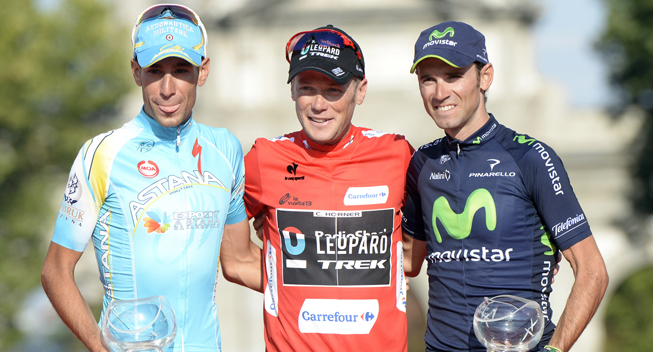While the Giro d'Italia and Tour de France courses have both been unveiled, the Vuelta a Espana won't present the layout of its 2014 edition until January 11. However, As has revealed some of the initial plans for the race with a brutal third weekend and a time trial on the final day set to be decisive.
All the major grand tour stars have started to put together their 2014 schedules but at the moment they are still working a bit in the unknown. While they already know everything about the scenes for the Giro and the Tour, the course for the Vuelta a Espana will remain a secret until an official presentation on January 11.
However, the Spanish newspaper As has detailed now detailed some of the key stages of the Spanish race. And as it has been the case in recent years, the 2014 edition of the Vuelta appears to be extremely mountainous one.
It is already known that the race will start in Jerez in the province of Cadiz where the race will stay for three days. The opening stage is known to be a time trial but it has not yet been determined whether it will an individual one or one for the teams.
In recent years, the Vuelta a Espana has had a tradition of having three consecutive summit finishes in the third weekend of the race. According to the newspaper, this will be the case again in 2014.
The brutal triptych will start on Saturday, September 6 with a finish on the 9,8km La Camperona climb which has a three kilometre section where the gradient stays between 17% and 22%. Known as "the son of Angliru", its inclusion was already rumoured last week and was tested by the Vuelta organizers earlier this year. If confirmed, the visit will be a first.
On Sunday, September 7, the race will continue with a summit finish on the legendary Lagos di Covadonga. Having been included 18 times since 1983, it is often visited by the Vuelta and was last climbed in 2012 when Antonio Piedra won from a breakaway.
On Monday, September 8, the riders will finish at the Lagos di Somiedo on the Farrapona climb. The finish was last used in 2011 when Rein Taaramae won from a breakaway while Juan Jose Cobo gave the first indications that he was the strongest rider in the race by finishing 2nd. The stage is likely to be a hard one and could include several other major ascents.
A rest day will precede the final week of the race that will include three or four stages in Galicia. While the third weekend will have a major impact on the GC, nothing will be decided until the very end. On the final Saturday, the riders will climb the Puerto de Ancares which has an average gradient of 9,25% and ramps of more than 20%. The climb was last included in 2012 when Joaquim Rodriguez and Alberto Contador battled fiercely for the race leadership, with the latter winning the stage.
As already reported, the race won't finish in Madrid in 2014. A nighttime time trial is likely to bring the race to a close in Santiago de Compostela. This will be the fourth time since Unipublic began organizing the Tour in 1979 that the race will finish outside the capital.
Chris Horner won this year's edition of the race and has stated his intention to defend his title in 2014.
| Philip HANDL 28 years | today |
| Kenta NAGAI 21 years | today |
| Geoffrey DERESMES 39 years | today |
| William BROWN 32 years | today |
| Sterre VERVLOET 21 years | today |
© CyclingQuotes.com









